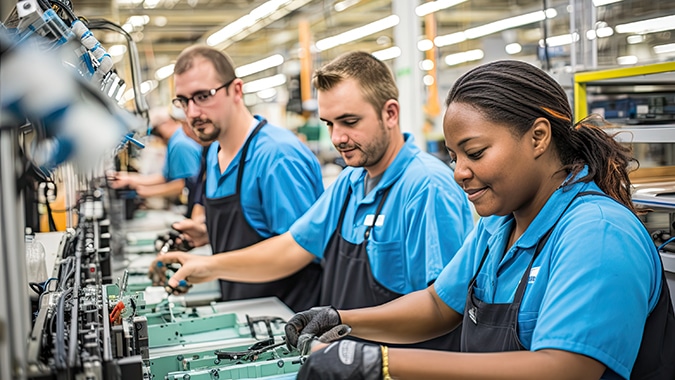Artificial intelligence is improving efficiency, workplace safety, product development, machine maintenance and supply chain logistics at manufacturing facilities everywhere, according to a report released by the National Association of Manufacturers this week.
The report, “Working Smarter: How Manufacturers Are Using Artificial Intelligence,” details how manufacturers of all sizes are implementing AI technologies to advance innovation and strengthen their workforces. The report also provides an overview of insights from leading manufacturers, including Johnson & Johnson, and makes recommendations on how policymakers can help support the safe, responsible development of AI.
“So much of the media and policymaking conversation is focused on generative AI, but AI is far more than that for modern manufacturers,” said NAM President and CEO Jay Timmons. “It’s infused increasingly throughout the shop floor, research and development and beyond. Manufacturers are leading the way in the use and development of new AI technologies.”
From developing more effective clinical trials and improving workplace safety to strengthening supply chain resiliency and supporting workforce training for employees, AI is unlocking new opportunities to strengthen the modern manufacturing workforce and improve the lives of all Americans, Timmons said.
“Congress and the Biden administration can support manufacturers’ adoption of AI by enacting strong data privacy protections, investing in workforce training and providing regulatory certainty,” Timmons said.
Lawmakers should “lean on” manufacturers’ deep experience when drafting AI-related legislation, said Johnson & Johnson Executive Vice President and Chief Technical Operations & Risk Officer and NAM Board Chair Kathy Wengel.
“Given the importance of this generational technology, policymakers must develop sensible, carefully thought-out frameworks for various AI applications — and they should lean on manufacturers’ years of experience to engineer those frameworks,” Wengel said. “We need a policy environment that supports innovation and growth in manufacturing AI, because it will bolster U.S. competitiveness and leadership in this critical emerging field.”
The report’s key policy recommendations include:
- Invest in research and development and career technical education institutions to train the modern manufacturing workforce.
- Pass federal privacy legislation to advance individuals’ privacy protections and give legal clarity that will support continued innovation by manufacturers.
- Use a risk-based approach to new AI regulations that tailors any future laws to specific use cases and minimizes the burden of compliance.
- Ensure that AI regulation is aligned globally.

